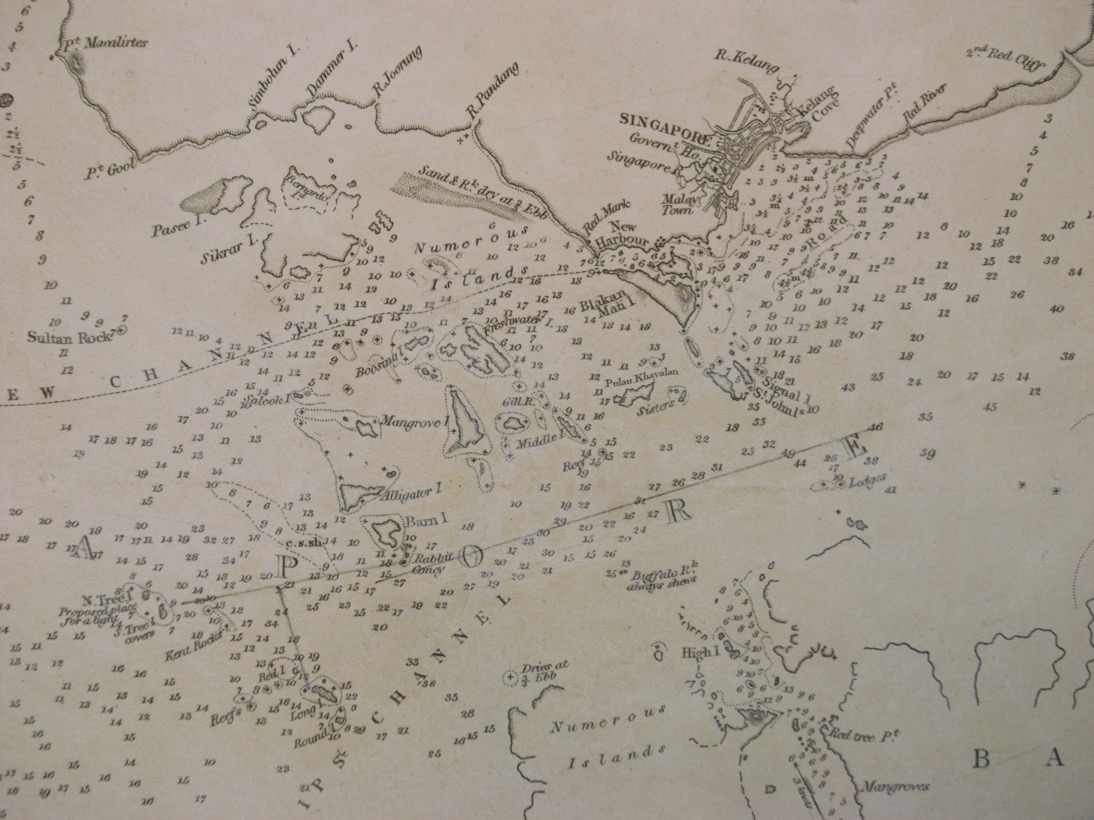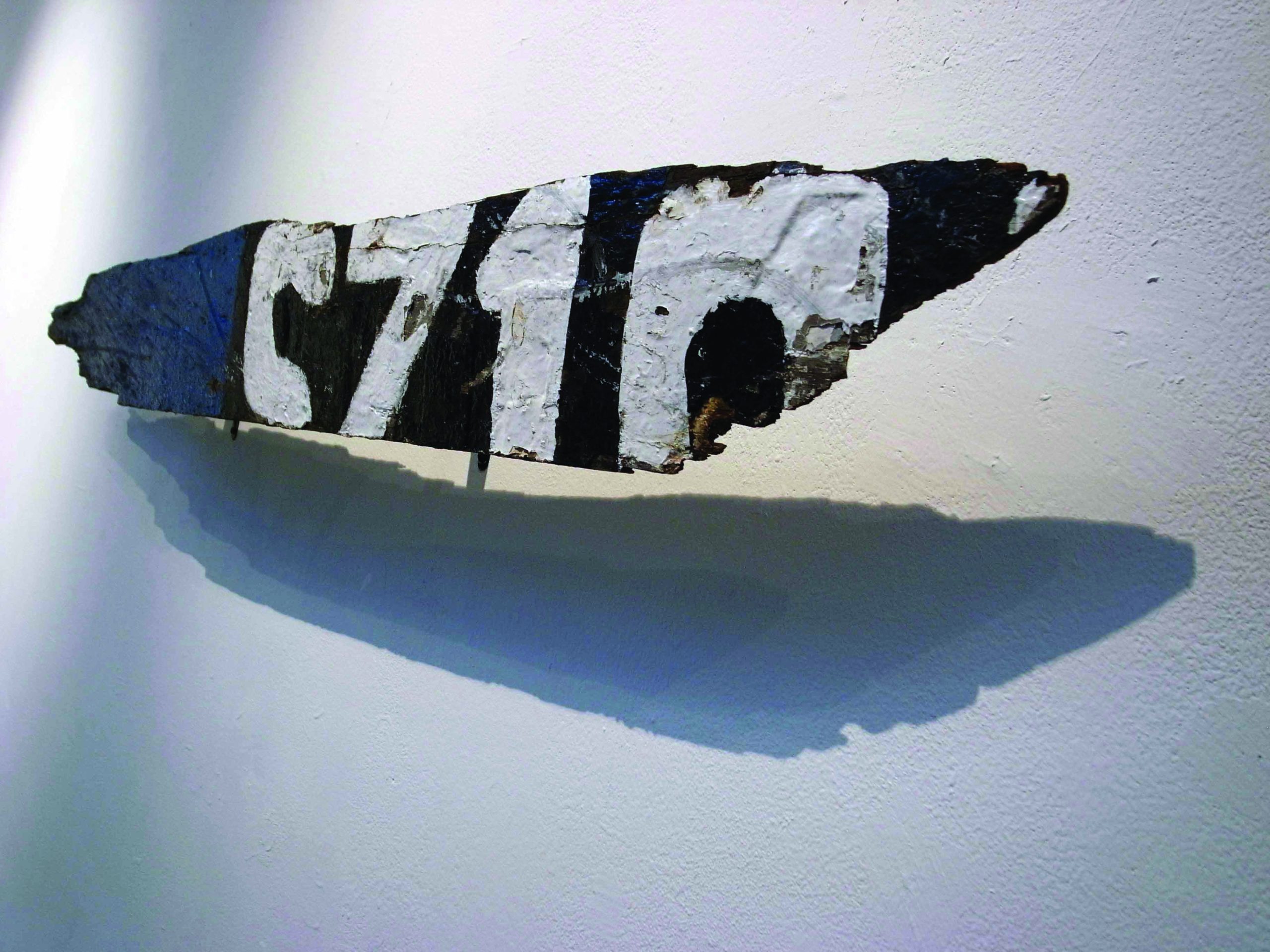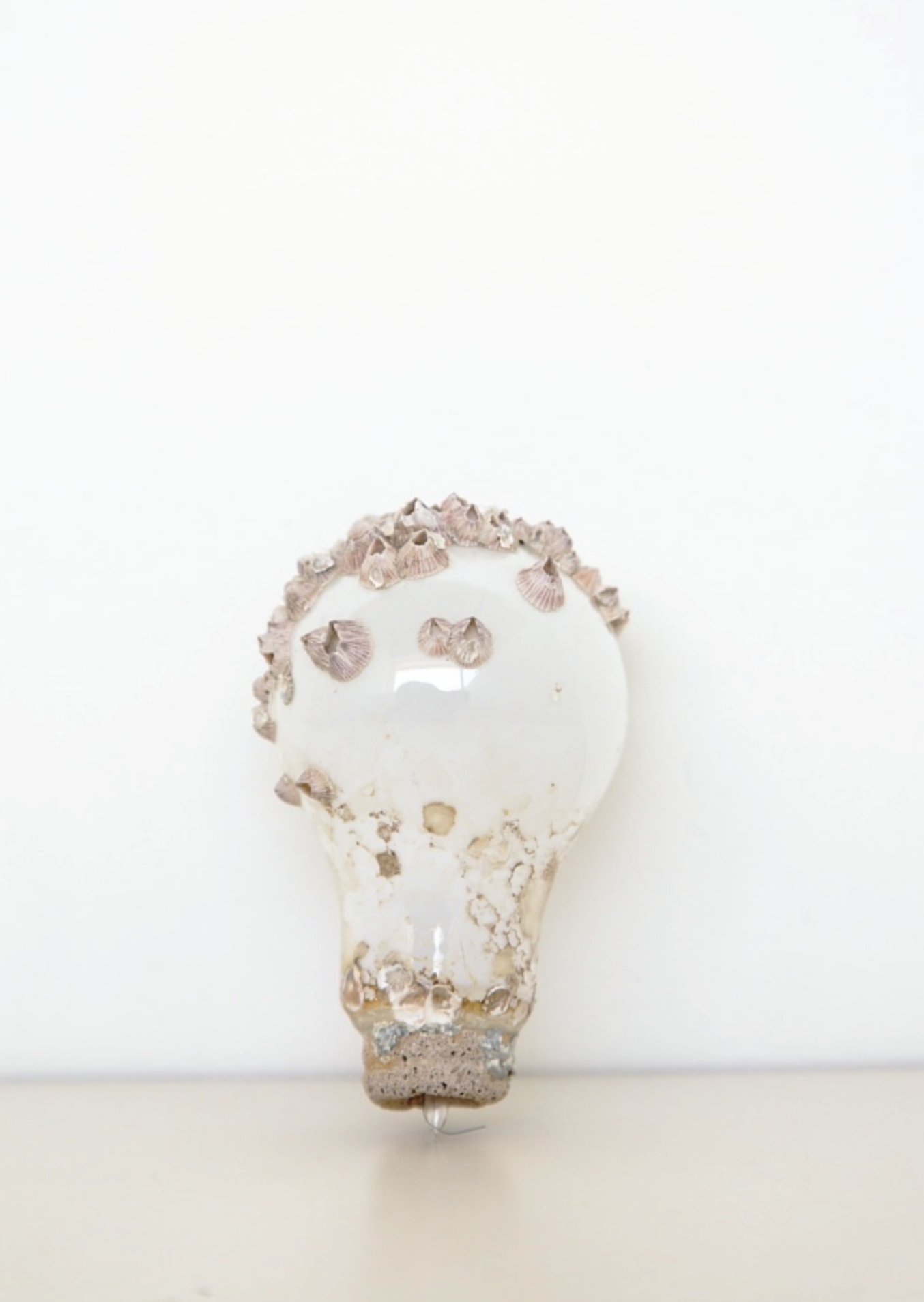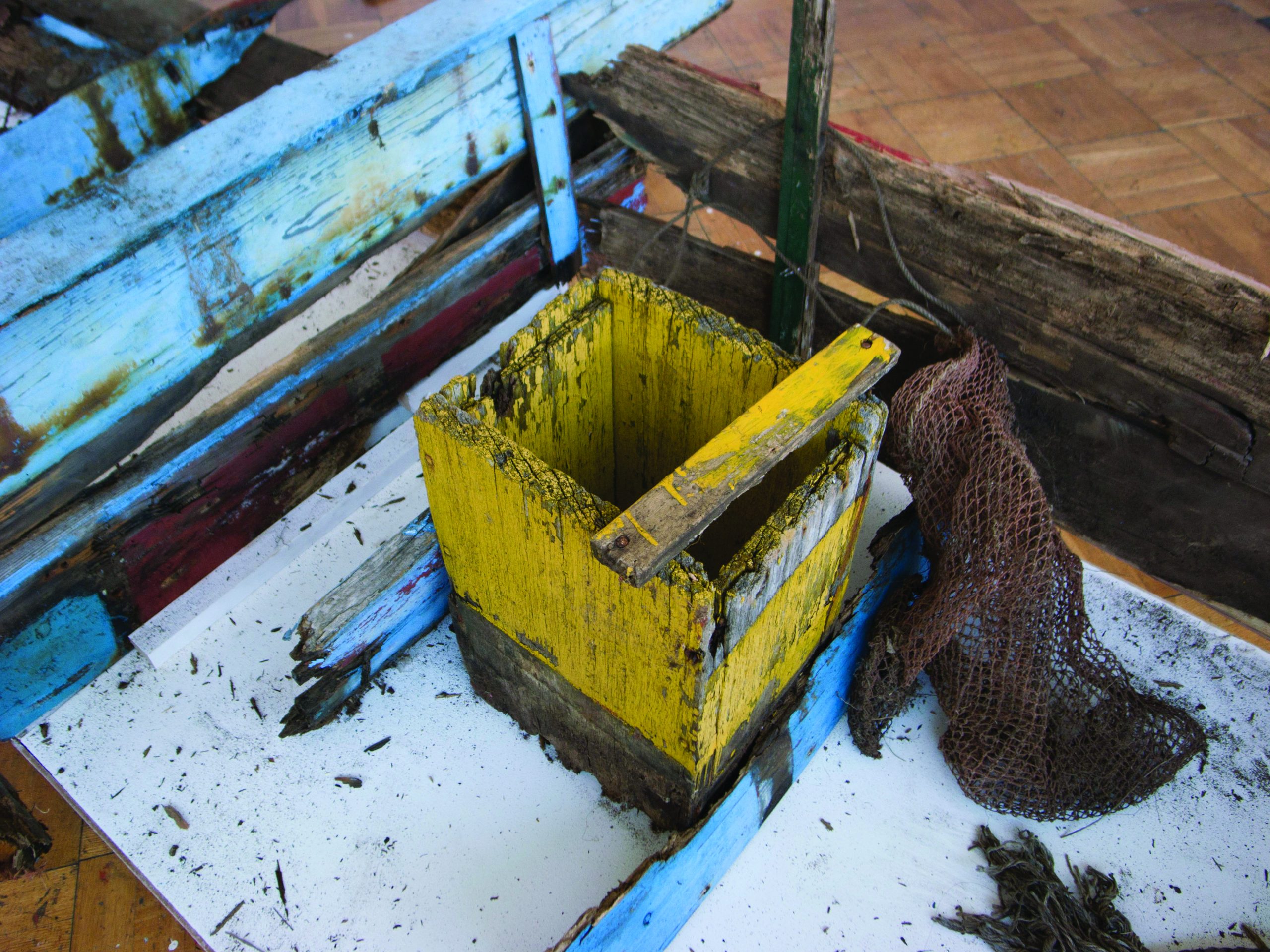Khayalan Island is rumored to have disappeared in the early 19th century just as Sir Stamford Raffles was establishing a post in Singapura. This project consists of gathering stories, collecting artifacts and conducting a journey to rediscover this island in the contemporary port of Singapore. Excerpts from The Story of Khayalan Island have been specially edited for this volume.

Singapore, Battam, Gallat, Sabon and Khayalan Islands Map,
Ink on paper, 1822/2014.
Image courtesy of the artist.

Remnant of a Vessel, 2013.
Exhibition view Institute of Contemporary Arts Singapore, Photo courtesy of the artist.
Spirit of a boat
7,253 meters
off the southern coast
of Singapura
rumor says
there was an island
in between
Belakang Mati and Sebarok
less than forty minutes
to circumambulate on foot
“shoals of stone and sand, with one to two feet of water at low tide, or even less on moon tide days, it would not be difficult to visit the islands without a boat”
yet there is a challenge to the feet
sharp igneous stone on the shallow bottom
known to cut the feet
interspersed with tree coral
on the southeast and west shores
which upon being broken
makes an earthy sweet sugar
now searching for the name of the harbor
I have not yet encountered anyone who knows precisely where it was.
was it forgotten, or is it more about forgetting?
an untold history of the people who worked in the harbor
the land they lived on
what they did after breakfast and before sunset,
looking after this harbor
watching boats come and go
lying under the shade of the sea almond tree
contemplating how to find stories
of a place on the verge of disappearing
…………
now strolling along the reclaimed coastline
what “Pulau Khayalan” did she refer to?
walking one foot in front of the other
square stones and cement orderly fitted one against the other
to hold back the uncertain land covered beneath the surface.
a clear image of a rib cage on this very site
flashes before the back of my eyes
fragments of a disintegrating boat
rotting senegal mahogany
half sunk in the mud
a wooden framework of a sampan boat remains
a spirit among all those that were once docked here
betel palm and rambutan trees dotted the harbor line
along with durian trees
whose wood was used to make sampan boats
sliced, stripped, bent and formed
noticing without waiting
…………
saltwater penetrating the wood fibers
keeping it alive day by day
now freshwater fills it like a tub
slowly rotting the disappearing planks
presence in absence

Search for an Unknown Island, 2014.
Image courtesy of Art Base Momoshima, Photo by Misaki Ohashi.
Island connecting to everywhere
sunshine
laughing
a-i-u-e-o!!!!
ooooo-aaaaaa
it has a mouth
it has chichi
in this shape!
this island
doko demo tsunagatoru
a bridge here
taka tall!
a bridge expert
can get there in one minute
……..one minute
one minute!
or by boat
this island moves
it moves
can go in one minute de
kore na
it moves
in katakana
arriving in one minute
ankiro sound
stone
“can get there in one second”
whale island anchor
ooooaaaa
ummmmmmmmm
kokoya
“what are you writing?”
a dolpin
Mushroom Island
a-a-a
this island
shio-Ta haru-KI
I wrote “doko demo tsunagaru shima”
“island connecting to everywhere”
pirates, whales, sharks and mushroom island
sea, bridges and…
island city
treasure box
many shapes for islands
children
open
an island in the mind
“doko demo tsunagaru shima”
preparing for a journey
to an unknown place
where it is possible
to build a city
appreciating what lies below
inside the earth
water
people
life
reconnect
is this the future
or is it the past?
Really

Journey to an Unknown Island, May 6, 2014.
Photo by Mihoko Furuya.
The scenic channel
one of the smallest boat taxis
six passengers max in the hatch
the dock on the other side
must be far smaller than this one
wind from the south
steadily picking up since we arrived
standing still moving
our boat stops three boats away from the dock
scurry across
one boat to the next
touching for a moment
engines pushing together
ropes lie coiled on deck
green potted plants
on the rooftop of the boat
as I duck in below
flowers, grass and a small tree
with heart shaped leaves
looks so familiar
but not in this generation
a locust tree from Whaddon?
seeds carried from Holland
to be planted in the contingent ecosystem
on the boat
a gentle rocking begins
swaying continues
for the rest of the journey
back and forth——up and down
unpredictable but rhythmic
three other passengers board quickly
sitting on the blue painted slats
we face each other
sliding away from the harbor
just as we push off from land the boat rocks fiercely
jerking starboard and port
waves colliding
as if we might capsize, but that’s impossible
the captain is far too relaxed for that
…………
a choice between a scenic pathway
or the shortest route between two points
inside the boat
slipping off my sandals to step up the five stairs
to the driver’s cabin,
one young boy sits listening to music on headphones
while the other drives
with one hand on the steering wheel, the other hand texting:
………….
in this steamy cabin
a/c reserved for the passengers
watching ahead through scratched and tinted plexiglass
looking down far from
Pulau Belakang Mati on the right
slowly moving forward in the channel, depth 23 meters
previously 2.5 meters at low tide
dredged for passage of tankers in the 1980’s
underwater scenery distorted
memory of contours in dissaray
Kusu Island on the left
slowing down near St. John Island
…what is that tuft of mangroves in between
a sign of Khayalan?

Khayalan Island Artifact
Image courtesy of Art Base Momoshima, Photo by Taro Furukata.
Digging
sitting beneath mangrove shadows
exhausted
lost
I quit searching
a light blue plastic corner protruding from the sand: a clue?
the two of us start digging along the edges to find its dimensions
with cupped hands pulling handful after handful of sand away
from the uncertain form
a stern begins to appear
toru looks for anything that could become a shovel
foraging amidst a rusty gas can, aluminum foil, a blue rubber sandal with no match
round plastic
and bottled plastic
and more plastic
he grabs a broken plastic pitcher and a small white bucket
all useful items
yesterday
we dig
and dig
uncovering red ants,
plastic bags
and rope.
dig, dig, digging until light-headed
pausing by the sea
a plank of wood floating on the threshold of land and water
rotting, heavy with seawater
dark blue paint on one side raw wood on the other
the letters “SZ18…” in white but cut off halfway
…………
certainly a boat, but far too deep and much much bigger than it appeared
a tree sprouting through the midrift
completely buried in sand—probably won’t float anyway
canary tree leaves now lie where passengers sat decades ago
sailing between Changi, Pulau Ubin and Tekong Islands
is…land
island
what is land?
…………

Reconstructed Vessel. Decaying wood and paint.
Exhibition detail from Tokyo University of the Arts, 2014.
a yellow square box in the center towards the rear of the boat
immediately intrigued
with its chipping paint
and faint wood core
fading with the saltwater wind
without human touch
yet retaining the memories
of nakamura
the man who cared for this boat’s delicate existence
in the last years he slowly lost the mobility to venture out
fish were dwindling
and the aching of his lower left back
made it painful
to sit
on the boat slats
for more than an hour
it was even more painful
for him to recapture the feeling
of returning home at dusk
with the blue waterline of his boat riding low in the water
heavy with buckets of pomfret and mackerel
moved
by these memories
in the disintegrating boards
of this small wooden boat
5.5 meters long
vanishing
staring at the rib cage of this skeleton
on the verge of returning to the earth
only visible because of all the oversize garbage items
that have been disposed of inside of its gunnals
standing back
to gaze at what’s left of its hull
no trace of its name on the chipped paint
nothing but bright red painted boards remain
but three can be quite easily reassembled
one split matches the next
after noticing this
I set down the red parts
and notice a corner of curved wood
a stunning shape
that is no longer retained
on boats today
sleek square hulls
a slice of evidence to be examined
no name, just one pale sky blue piece of wood
Unknown Island
start with water
then look at the traces
of that water
paint an Island
that doesn’t exist
paint another faint layer
a very thin wash
the whiteness around an island
minimal void
emptiness around the islands
it can be the sky
it can be water
that experience
i paint what i know
not what i see in the outer environment
I work to know the tree
by observation
talking to people around
the locals
to feel the weather
to paint what I know
in the landscape
try to remember that feeling
I found there were no mountains in Singapore
linear
flat lines
what is this flatness
obviously a lot of it is manmade
there used to be many hills
here looking at photographs
but there is a closeness
of bringing land and water
together
making new shapes
I see long linear lines
I feel a peacefulness
in this imaginary landscape
a seagull struggling in the
harsh wind
being pushing up and down
while trying to go forward
I will just add some ink
and see what happens
the paper itself
has a lot of properties
its like meditation
imagine myself there
in the island
start building a boat
in the shadow of the island
faded, not very clear
blending with the shadow
the boat is the darkest of all the forms
stones are a mix, big rocks in the front
dark ink with dry brushstrokes
looking through the cliff
and in the back there is the island
with space between the island and the cliff
get on the boat
actually, only part of a boat
not the whole boat
but the boat might not make it there
because its an imaginary island
viewers can swim there
or they could fly
